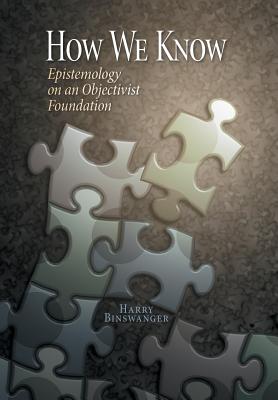How We Know: Epistemology on an Objectivist Foundation

How We Know: Epistemology on an Objectivist Foundation
What is knowledge? How is it acquired? How are claims to knowledge to be validated? Can man achieve rational certainty, or is he doomed to perpetual doubt? How We Know presents an integrated set of answers to these and related questions, based on Ayn Rand's Objectivist philosophy, including her unique theory of concepts. Rejecting the false alternative of mysticism vs. skepticism, Harry Binswanger provides an uncompromising defense of reason, logic, and objectivity. Using vivid examples, he traces the hierarchical development of knowledge, from its base in sensory perception, to conceptformation, to logical inference, to its culmination in the principles of science and philosophy. How We Know explains how following methods of cognition based on the facts of reality and on the nature of our cognitive equipment makes it possible to achieve rational certainty, no matter how abstract the issue. Harry Binswanger earned his Ph.D. in philosophy from Columbia University in 1973. He has taught philosophy at several universities, most recently at the University of Texas at Austin. Dr. Binswanger was an associate and friend of Ayn Rand in her final years, and since 1986 he has served on the Board of the Ayn Rand Institute. He is the author of The Biological Basis of Teleological Concepts and the editor of The Ayn Rand Lexicon, a mini-encyclopedia of Objectivism. He co-edited the expanded second edition of Ayn Rand's Introduction to Objectivist Epistemology. Currently, Dr. Binswanger runs HBLetter, a subscription-based website on Objectivism.
PRP: 330.58 Lei
Acesta este Prețul Recomandat de Producător. Prețul de vânzare al produsului este afișat mai jos.
297.52Lei
297.52Lei
330.58 LeiLivrare in 2-4 saptamani
Descrierea produsului
What is knowledge? How is it acquired? How are claims to knowledge to be validated? Can man achieve rational certainty, or is he doomed to perpetual doubt? How We Know presents an integrated set of answers to these and related questions, based on Ayn Rand's Objectivist philosophy, including her unique theory of concepts. Rejecting the false alternative of mysticism vs. skepticism, Harry Binswanger provides an uncompromising defense of reason, logic, and objectivity. Using vivid examples, he traces the hierarchical development of knowledge, from its base in sensory perception, to conceptformation, to logical inference, to its culmination in the principles of science and philosophy. How We Know explains how following methods of cognition based on the facts of reality and on the nature of our cognitive equipment makes it possible to achieve rational certainty, no matter how abstract the issue. Harry Binswanger earned his Ph.D. in philosophy from Columbia University in 1973. He has taught philosophy at several universities, most recently at the University of Texas at Austin. Dr. Binswanger was an associate and friend of Ayn Rand in her final years, and since 1986 he has served on the Board of the Ayn Rand Institute. He is the author of The Biological Basis of Teleological Concepts and the editor of The Ayn Rand Lexicon, a mini-encyclopedia of Objectivism. He co-edited the expanded second edition of Ayn Rand's Introduction to Objectivist Epistemology. Currently, Dr. Binswanger runs HBLetter, a subscription-based website on Objectivism.
Detaliile produsului











